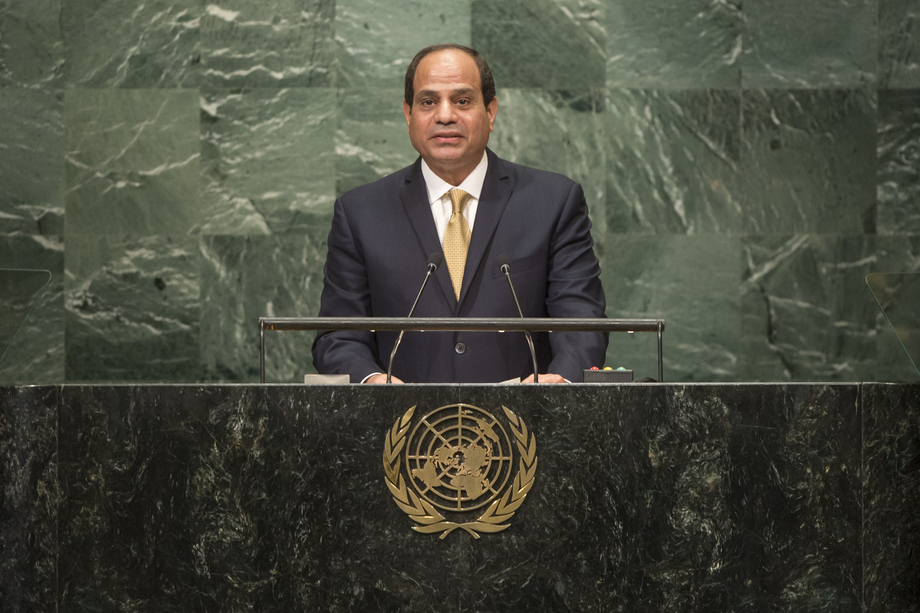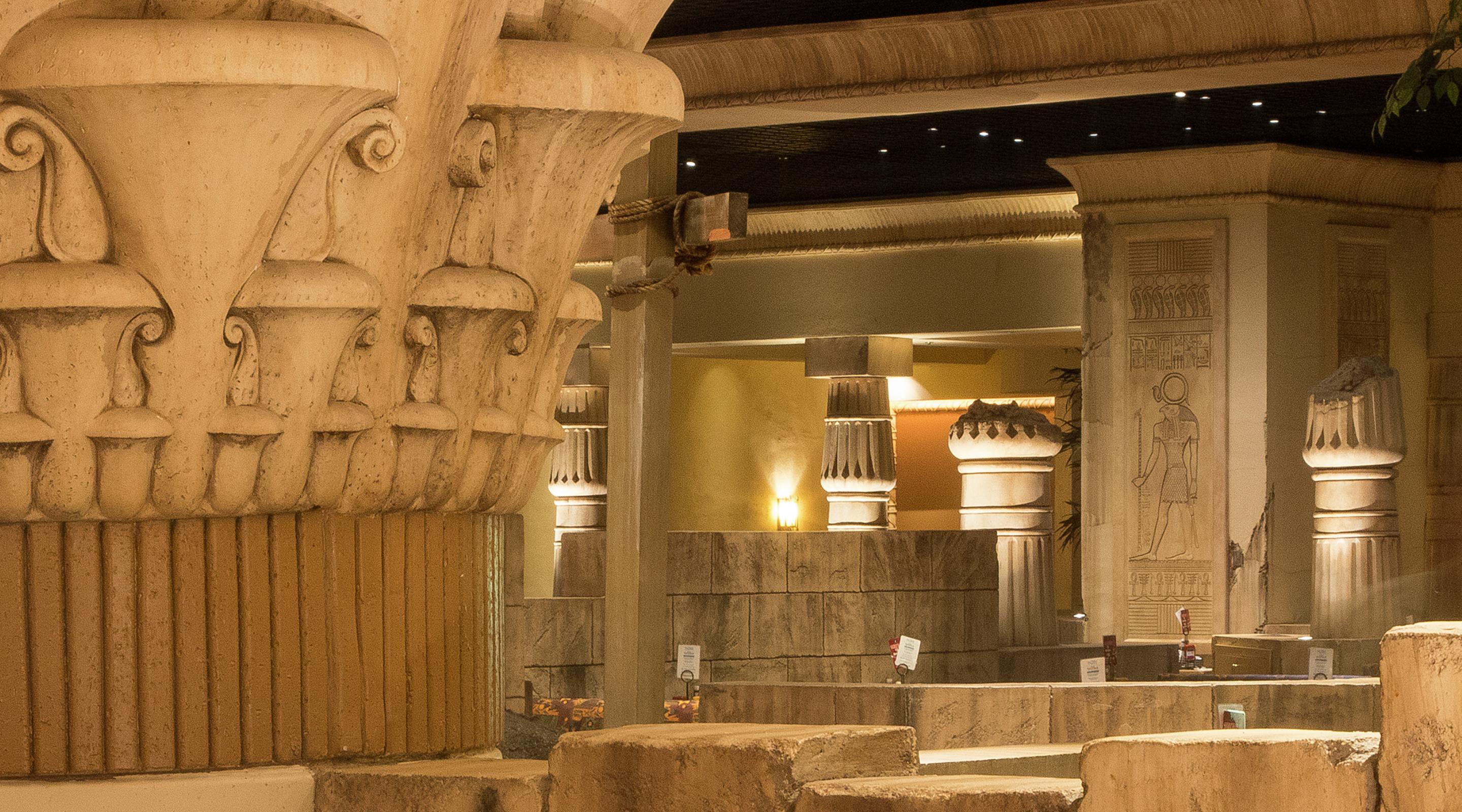| On Egypt’s Political Development:
“In the midst of these challenges facing the international order, the Egyptian people have succeeded in enforcing their will to achieve stability, to protect the state and its institutions, and even to safeguard the society from fragmentation and chaos. The Egyptian people approved a new constitution that enshrines the rights and freedoms outlined by the Universal Declaration of Human Rights, a constitution that establishes equality on the basis of citizenship, and consolidates protection for vulnerable groups, paving the way for women to occupy 15% of seats in the House of Representatives and expanding the representation of youth within it. That House of Representatives is now active in practicing its legislative
authority as well its oversight responsibilities over the executive authorities.”
On Egypt’s Economic Growth:
“On the economic front, Egypt is steadily moving forward in implementing an ambitious plan for economic reform which takes into account social considerations and the requisites of a decent livelihood for the Egyptian people. Egypt is also implementing giant national projects aiming to expand the road network and establish electrical and renewable energy stations, as well as developing the country’s infrastructure and industrial capabilities, and expanding agricultural territory.”
On Domestic and Regional Stability:
“While the Middle East continues to suffer from bloody conflicts, Egypt has managed to preserve its stability in the midst of a highly unstable region, thanks to the solidity of its institutions and its people’s awareness of their great cultural heritage. The international community must acknowledge and support this fact, to the benefit of the region and the world at large, so that Egypt may continue to act as an anchor of stability in the Middle East, sparing no efforts in carrying out its natural role by working with regional and international parties to restore security and stability in the region.”
On Syria:
“The bloodletting in Syria and the absence of any prospects on the horizon are no longer acceptable. What is necessary is clear: an immediate and comprehensive halt to all hostile acts across all of Syria, paving the way for a political solution that ends the bloodshed and preserves the territorial integrity and security of Syria and its state institutions, as well as realizing the aspirations of the Syrians, and putting an end to the chaos that has only served to facilitate the spread of terrorism.”
On the Middle East Peace Process:
“Egypt continues to pursue its utmost efforts to achieve peace in the region and end the Israeli occupation through negotiations and progress in the peace process, in order to reach a final settlement and sustainable and just peace on the basis of the two-state solution.”
On Libya:
“Egypt is playing an active role in bringing the Libyan parties together and supporting the implementation of the agreement as a means of regaining the unity and authority of the Libyan state over its territory, allowing it to operate via its legitimate institutions, represented by the Presidential Council, the National Unity Government, the House of Representatives, and the National Army. Egypt also hosts the meetings of our Libyan brothers to facilitate the implementation of the Sukhirat agreement, as well as the establishment of a National Unity Government representing all Libyans and its ratification by the House of Representatives, so that it may focus on reconstruction, in turn allowing the Libyan army to focus on combating terrorism. In this regard it is necessary to lift the arms embargo imposed on the army. There is no place for terrorism and militias in Libya; the time has come to restore the institutions of the Libyan state.”
On Yemen:
“In Yemen, Egypt is exerting every effort to support Yemeni territorial integrity and security, and the return of the legitimate government. We support the efforts of UN envoy Ismail Ould Sheikh, and his plan to resolve the crisis, which has been approved by the legitimate government in an effort to prioritize national interest…Egypt will continue to support efforts for a solution and for providing humanitarian assistance to our Yemeni brothers and sisters, in addition to our fundamental role in securing maritime navigation in Bab A1-Mandab and the Red Sea.”
On Security and Stability in Africa:
“With equal commitment, Egypt shoulders its responsibility towards the security and stability of Africa. Egypt is currently the President of the African Peace and Security Council, and in this capacity is focusing on enhancing cooperation between the African Union and the United Nations with regards to growing transnational threats, including terrorism and organized crime. We aim to bring about a shift in addressing conflicts, on the basis of the principle of “national leadership and ownership” to ensure the success of peace-building efforts.”
On Confronting Terrorism and Extremism:
“Egypt has always been keen to stress that the endeavor to defeat terrorism will never achieve its ends unless we address the roots of the phenomenon, confront terrorist groups with decisiveness, and refute the extremist ideologies that give birth to terrorism and its proponents. Egypt calls upon the international community to take all possible measures to prevent terrorism from exploiting advances in information technology, which have contributed to endowing the phenomena of terrorism and ideological extremism with dangerous new dimensions that have grained them global reach. It is essential to end the broadcasting of channels and the hosting of websites that incite violence and extremism.”
On Sustainable Development:
“Egypt calls for the support of the role of the state, in order to guarantee a balance between the different dimensions of sustainable development, particularly in relation to the effectiveness of social security networks, and advancement of national ownership of development. Egypt also stresses the importance of harnessing the global monetary system to establish a fair global economic system, one that provides equal opportunities for development and contributes to minimizing the gap between developed and developing countries.”
On Combatting Climate Change:
“Last year we reached an agreement based on the principles of the United Nations Convention on Climate Change. As the coordinator of the group of African leaders on climate change, I affirm Africa’s commitment to confronting climate change within its abilities, and its aspiration towards putting into practice the implementation mechanisms of the agreement pertaining to transfer of technology and sustainable financing. As such, Egypt has established the track for the Renewable Energy Initiative and presented it in the context of its presidency of the committee of African leaders concerned with climate change, in implementation of the relevant African Union resolutions.”
On the Cultural Components of Development and Peacemaking:
“If culture is the reflection of the principles by which mankind lives, then we must employ culture, technology, and knowledge for the benefit of development and peace. As such, I call on the United Nations to give greater attention to addressing the cultural aspects of development and peacemaking, and the elimination of destructive ideologies, including via access to knowledge, transfer of technology, and confronting extremist ideologies. This must be undertaken in partnership with UNESCO, an organization the role of which has grown vastly in importance in today’s world. Egypt recognizes the ever increasing importance of this role, and the importance of taking utmost advantage of the organization with a view to achieving a better, safer, and more understanding world in which there is room for all. |


